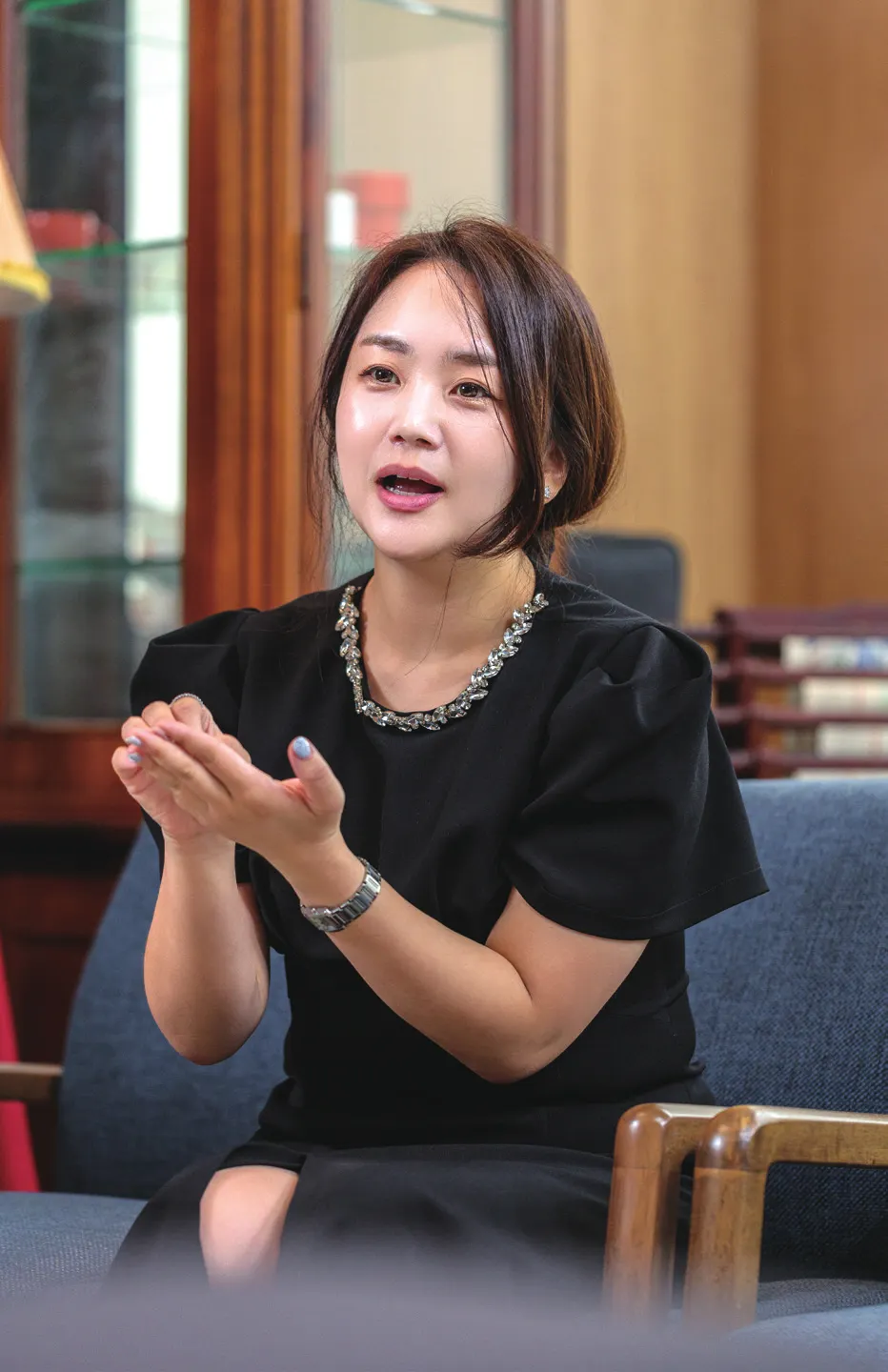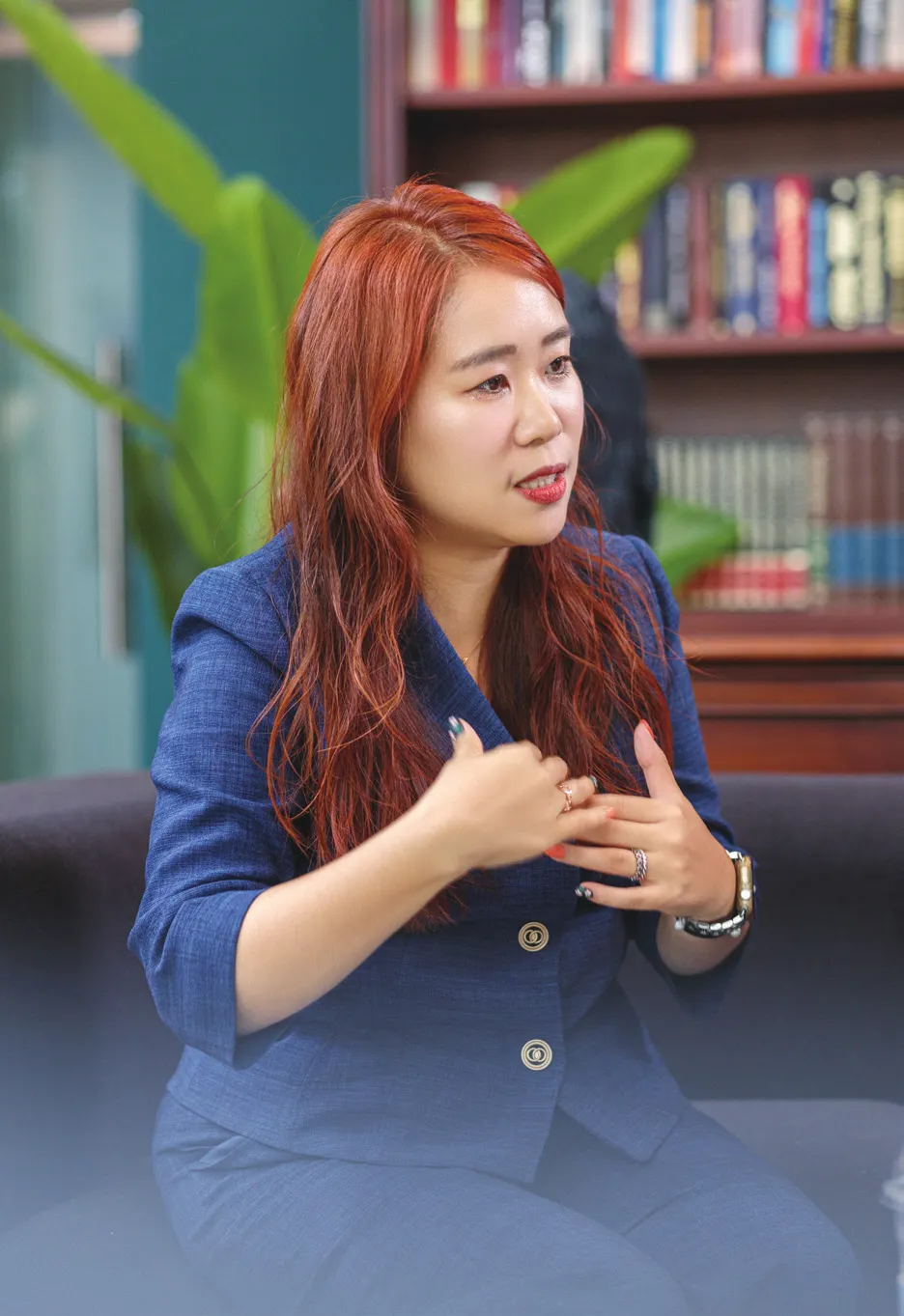The global expansion of startups is accelerating and becoming a major trend, often described as the ‘destiny of startups’. In light of this, JCCEI has begun promoting global open innovation for startups aiming to help them enter foreign markets and develop joint business models. They plan to offer comprehensive support and foster cross-border collaboration through partnerships with FreeD Group, K-Style Hub, and Seoul Unniedeul, particularly given their experience in entering the Chinese and Southeast Asian markets. What vision and strategy will JCCEI and its partners use to successfully drive global expansion? We have discussed this topic.
Representatives of Global Open Innovation partner companies discussing strat egies for overseas expansion.
Global Expansion of Startups, Why Now?
Jae-Hyeong Lee We have some key partners here who are working with JCCEI on global expansion. We’ll discuss various topics related to global expansion. To start with, let’s look into the various reasons why the domestic startup industry prioritizes global expansion and the features of local markets.
Min-Gyu Lee I think the main issue is the size of the market. While we are seeing some unicorn companies emerge, I don’t think we’ll see any decacorn companies. That’s why I believe that overseas expansion is crucial for the development of the startup ecosystem in Jeju Island and our nation as a whole. When speaking to investors, many often assess the potential for global expansion. They tend to favor startups that have already gone international.
Saet-Byeol Park I agree that going global is the key to accessing larger markets. Korean companies’ technology and product power are being globally recognized, so startups have enough qualifications to go global. However, they cannot simply rush into it without careful consideration. It is necessary to thoroughly analyze and measure the PMF(Product-Market Fit) of new business models. Tests in various aspects, including both online and offline, are required because the reactions of buyers and consumers can differ.
Jae-Hyeong Lee As you pointed out, the pre-investigation and analysis stage is important, but it can be burdensome due to the costs and time involved. There may also be doubts about whether it is worth taking risks and expanding globally without a guarantee of success.
Min-Gyu Lee It can be quite challenging for Korean companies to enter the Hong Kong market because it is an expensive city and both English and Cantonese are spoken. Nevertheless, I recommend targeting the Hong Kong and even the Chinese market, as they are lands of opportunity. A notable example is that Hong Kong imports over 95% of its food and agricultural products from abroad. This means that there is a great need for products from overseas brands. We have a great chance for success if we develop exclusive content and implement a premium approach. Moreover, as a large market with connections to the Guangdong Province, including Shenzhen, China, it could serve as a stepping stone for Jeju companies looking to enter the Chinese market.
Yun-Jeong Park Southeast Asian market is similar yet a little different. Korean dishes like japchae, tteokbokki, and galbi soup are becoming popular. However, since Indonesia is primarily composed of islands, it’s difficult to sell ready-to-eat products like meal kits due to high logistics costs. There are many alternative ingredients that are locally available that can replicate the flavors of Korean tteokbokki. Therefore, startups need to come up with their own innovative ideas.
Min-Gyu Lee, Group Director of FreeD
Advice for Success in Global Expansion
Jae-Hyeong Lee Since the global market is unfamiliar and unpredictable, startups thinking about global expansion will have many things to consider. We’d appreciate your insights on what to prioritize based on your experience with global expansion.
Saet-Byeol Park Analyzing the market you want to enter is a fundamental step. A product that’s popular in one country might not succeed in another. Just as Korea, China, and Japan have different cultures, countries like Indonesia, Thailand, and Myanmar have their own unique culture. A different strategy must be developed for each country.
Jae-Hyeong Lee What about taking a simpler approach to accessing the global market? Would using a global commerce platform to sell the products overseas be sufficient, without needing to establish a local entity?
Yun-Jeong Park Of course, that’s a good way to test the marketability in advance. However, for the continuous scale-up of a startup, it’s inevitable to establish a local entity. Even in a country like Indonesia, where there is active investment in startups, the target is mainly local entity companies, not foreign companies. In many cases, local ownership is required for incorporation, so it’s recommended to work with a trusted local partner from the beginning.
Saet-Byeol Park The Southeast Asian market is diverse, with each country having its own specific process for incorporation. Given the limited time and resources, managing all these processes alone can be challenging for a startup. In case setting up a local entity is unavailable right away, it’s beneficial to cooperate closely with partner companies to secure the market, and then establish a local entity as the market expands.
Jae-Hyeong Lee Many startups have been making attempts to enter the global market, and some are now starting to show some positive outcomes. How would you assess the overall performance of Korean startups in the overseas market?
Min-Gyu Lee In Hong Kong’s downtown Tsim Sha Tsui, Korean brands have a strong influence. Especially Korean chicken brand stores are so popular that people are waiting in line for more than an hour to get in. Chinese companies are also creating and promoting similar Korean food. It is highly competitive.
Saet-Byeol Park The K-beauty market has a similar trend. Four to five years ago, large companies dominated the market. However, in the past two or three years, independent brands such as Beauty of Josun and Huxley have grown rapidly. The 2024 Beauty & Healthcare Show, taking place in Incheon, will feature mostly independent brands in the beauty category.
Jae-Hyeong Lee As pointed out, the results of Korean startups entering the global market are becoming noteworthy and are being shown in different ways. There has been a growing number of consumers searching for small brands, which indicates that there are more chances for niche markets. We should also talk about the reasons behind these accomplishments. I wonder whether the market’s needs and supply just happened to fit together or if startups have carefully and strategically pursued overseas expansion.
Min-Gyu Lee I believe that both factors were essential. Korean content, like K-pop and dramas, has gained remarkable popularity. There has been an increase in the global consumption of Korean culture. Startups can address those needs. They are focused on resolving the issues we are facing. That’s why startups show more apparent accomplishments in global expansion.
Yun-Jeong Park Large companies have longer decision-making processes and procedures, so it’s difficult for them to keep up with trends. Startups, on the other hand, can execute something quickly if the reason for action is reasonable and there are enough ideas.
Saet-Byeol Park, CEO of Seoul Unniedeul
Strategic Partnerships for Global Success
Jae-Hyeong Lee JCCEI started global open innovation with the idea that different strategies are needed compared to existing global expansion support projects. So, the primary necessity for us was partners who had a deep understanding of the global market. Thanks to these amazing partners, our global open innovation targeting Hong Kon and Southeast Asia is moving forward smoothly. I am interested to learn what motivated you to collaborate with JCCEI.
Min-Gyu Lee First of all, Jeju has a wealth of unique content. In e-commerce, the top three products usually make up 70% of total sales. But these products are also sold in other places because of the nature of e-commerce. Therefore, to increase competitiveness, companies must either lower prices or improve their content. The fact that Jeju has unique content is the most appealing aspect. Moreover, when I travel to Hong Kong and China for business, I notice that Jeju is being mentioned more often and locals are showing a lot of interest in it. If we bring the unique content of Jeju startups to Hong Kong, both Jeju and Hong Kong will benefit. Most importantly, I was also convinced that we could effectively promote Jeju’s content if we utilized the closed mall operated by the FreeD Group. We’re getting a great deal of support from JCCEI and IMM Investment Hong Kong, and we really want to present good results.
Yun-Jeong Park As K-beauty continues to dominate the Southeast Asian market, the industry is gradually expanding to include health functional foods. Products from Jeju, known for its clean nature, are becoming more competitive in this trend. The visa-free entry for Indonesian citizens is a major benefit for Jeju. It allows tourists to visit Jeju easily and freely share their experiences on SNS. Marketing to those tourists would be effective. Since now is the right time to promote Jeju’s products in Indonesia, we decided to support Jeju startups entering the Indonesian market
Jae-Hyeong Lee I understand the representatives Yun-Jeong Park and Saet-Byeol Park are currently organizing an exhibition to showcase the products of Jeju startups as part of this global innovation. I want to learn what further roles you will play as a cross-border entity, beyond just offering sales channels and promoting the products.
Saet-Byeol Park Seoul Unniedeul has started preparations to establish the ‘Global Online Jeju Goods Store’ in Singapore, Thailand, Indonesia, and Myanmar. You can think of it as the next phase of global open innovation. We are focusing on two major aspects. First, it serves as a test bed to evaluate the consumer response to B2C Jeju beauty products. Second, conducting offline buyer showcases will be an opportunity to assess the potential of the local buyers. The support doesn’t stop here. We regard all 30 companies that participated online exhibition, including the 5 startups that joined the JCCEI Global Open Innovation, as our customers and plan to provide continued support with entry, buyer discovery, and marketing in the coming and following years.
Yun-Jeong Park K-Style Hub has been selected as a distribution partner for the Jeju Special Self-Governing Province Economic and Trade Promotion Agency’s Jeju Product Global Offline Support Project. We will be launching the offline flagship store of the Indonesian Unnies beauty app in Jakarta this October. Here, we will operate a Jeju offline store at the same time. This would be the opportunity to introduce the products we promoted online through Seoul Unniedeul directly to consumers and buyers offline. We will provide comprehensive support that covers both online and offline, including consulting and matching.
Yun-Jeong Park, CEO of K-Style Hub
Envisioning Sustainable Growth for Jeju Startups
Jae-Hyeong Lee Lastly, do you have any advice for startups seeking to expand globally?
Min-Gyu Lee I’m sure everyone would agree that global expansion provides a lot of benefits. However, it’s also quite challenging. It’s a difficult time to succeed as a startup, even in the domestic market. The global market requires twice or three times the effort. Please keep in mind that you need to invest a lot of time, funds, and personnel. Consistently contemplating and preparing for the best strategy that meets with your business model and vision, as well as identifying reliable partners to help you achieve this strategy, will surely result in favorable outcomes.
Yun-Jeong Park I’d like to share two points. First, don’t neglect the domestic market even after expanding globally. Some businesses fail to perform domestically and then look for opportunities abroad, but having a solid foundation domestically increases the chances of success in global markets. Second, look at things from a long-term perspective for at least 1-2 years. You’d agree it’s not easy to succeed in a different language and culture in a short period of time. Patience is the key, as many cases show success after long-term efforts.
Saet-Byeol Park Jeju is now home to many notable startups and products. These companies have succeeded in product development, design, and marketing. Brands with strong global competitiveness are being created in many places. Jeju’s local value and brand power can be an advantage. However, I suggest that those planning to expand overseas use the element to the fullest extent possible but not limit themselves to Jeju alone.
Jae-Hyeong Lee When entering a new market, we must remember that it involves deeply understanding local culture and consumer needs, and developing strategies accordingly. We also saw that Jeju’s unique culture and content have global competitiveness and many new opportunities. We hope that all partner companies and startups collaborating with the JCCEI will succeed in global expansion, through which the creative and innovative ideas of Korean startups, including those in Jeju, will be widely recognized worldwide. Thank you.





